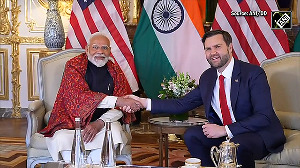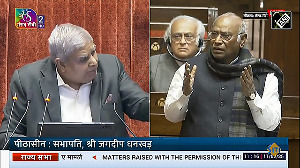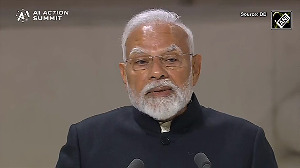India and 24 other developing countries have approached the World Trade Organisation for a fast-track resolution of issues on the Doha work programme.
The list includes finalising the modalities on agriculture and non-agriculture market access negotiations before the Cancun ministerial meeting in September as well as a solution to the development issues -- strengthening the special and differential provisions and trade-related intellectual property rights and public health.
The paper submitted by the 25 member countries also touches upon the Singapore issues -- investment, competition policy, transparency in government procurement and trade facilitation -- and points out that the WTO members are divided on the inclusion of the subjects. It recommends a separate treatment for each of them.
Meanwhile, at a recent meeting of the Working Group on Trade and Investment in Geneva, the Indian delegation said there was no decision on starting negotiations and if there was any, it would be through explicit consensus.
India and members like China, Indonesia, Malaysia are of the opinion that multilateral rules will limit the policy space available at present and, therefore, oppose their inclusion.
Trade experts say even the US is not too inclined towards including the investment issue and is against bringing competition policy under the WTO. The US does not believe its companies stand to gain much from it, according to the experts.
"The US believes in a system that does not lay down any responsibilities for companies, which can challenge any government in court," says Nagesh Kumar, director-general of Research and Information for non-Aligned and other developing countries, which is advising the government on investment-related issues.
A paper presented by India in November 2002 proposed that a set of responsibilities and a code of conduct be laid down for companies. The US is, however, not comfortable with the idea.
For the European Union, the Singapore issues, particularly investment, are crucial. Officials say the EU is expected to be isolated on the issue of subsidies in agriculture, and having realised this, Brussels is pushing for inclusion of the Singapore issues.
The EU wants the issues on the agenda in return for agreeing to cut subsidies on agricultural products. India has decided to block the issues.
Services
The commerce ministry kicked off inter-ministerial consultations this week to finalise India's proposals for the WTO negotiations on services. The consultations are scheduled to go on till June 17.
The focus of the offers, expected to be submitted by June-end, will be on maximising benefits for the free movement of professionals.
Simultaneously, to garner support for its agenda, India is lobbying hard through a group of WTO members called "Friends of Mode 4", which includes Philippines, Indonesia, Thailand, South Africa and some Latin American countries. Canada, the EU and US may also join the group later.
"The idea is to unite like-minded countries on the issue and seek higher market access for professionals," says a government official.
To seek higher market access for professionals through easier visa norms, India will need to undertake commitments in Mode 3, which deals with commercial presence through subsidiaries and branches, experts point out. The government is willing to do so since many restrictions have been eased unilaterally.
India's schedule of commitments under the General Agreement on Trade in Services covers sectors like communications, financial services and tourism.
According to a World Bank study, India has commitments in 33 activities, against an average of 23 by developing countries.
Barring a few like audit, legal, posts and courier services, distribution comprising retail and wholesale trading, commission agent services and franchising activities, India is willing to undertake commitments in other areas.
Requests for nine sectors have been submitted so far. Now, the strategy would be to identify sub-sectors within these categories, for which a Cabinet clearance had been received, officials said.
Consultations have so far been held for sectors like insurance, where India may offer higher foreign investment limits.
Similarly, in architecture, India proposes to permit foreign professionals to offer services in partnership with Indian players.
While making the offers, commerce ministry officials said, due consideration was being given to the request made by key trading partners so that the right balance was achieved.
A delicate balance
- The third mini-ministerial meet before the Cancun Ministerial in September will be held in Cairo on June 20-21. The previous two meetings were held in Sydney (Dec 2002) and Tokyo (Feb 2003) The areas of focus will be:
- Work out a solution to bring agriculture and non-agricultural market negotiations back on track.
- Convince the US to honour the commitments on trade-related intellectual property rights and public health.
- Developing countries to seek solution of implementation issues and operationalisation of special and differential treatment provisions.
- The European Union is expected to push for inclusion of Singapore issues on the agenda.






 © 2025
© 2025